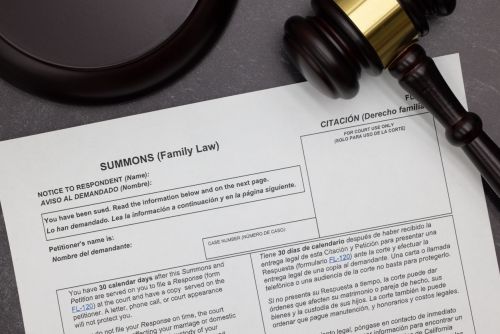



If you are thinking about parting ways with your spouse, the legal process associated with divorce can seem overwhelming. However, it’s important to understand that there are certain procedures involved. The first step in commencing a divorce in New York is to file and serve a “Summons and Complaint” or a “Summons with Notice.” But once the divorce summons is served, what happens next?
Here is the process associated with commencing divorce proceedings in New York:
Regardless of whether a divorce is contested or uncontested, a divorce summons must be filed with the court and served on the defendant spouse in order to commence a case. The divorce summons is the official document that informs the defendant that the action has been commenced. The divorce summons can be either with notice or a complaint.
A divorce Summons with Notice includes a brief description of the case and the relief requested by the plaintiff spouse. Notice is typically used in cases where a plaintiff wishes to commence an action quickly — a complaint would still need to be filed and served at a later time. A complaint is much more extensive and provides more details about the issues in the case.
Importantly, after the papers have been filed with the court, service of process must be carried out correctly to avoid any delays or procedural defects in the case. Under New York law, divorce papers must be personally served on the defendant spouse within 120 days of filing them. Service can be made by anyone over the age of 18 who is not a party to the action. The person who served the papers must complete an Affidavit of Service and return it to the plaintiff, signed and notarized. This is proof that the papers were properly delivered.
A defendant only has a limited amount of time to respond to the divorce summons. If they were served within New York State, they have 20 days to respond. In the event service was made outside New York State the time to respond is 30 days. However, it’s important to note that the 20-day period is not always a definitive deadline. Courts regularly allow defendants the opportunity to respond to a divorce summons beyond the 20-day period. A defendant may also make a formal request to Extend the Time to Answer.
The defendant’s response comes in the form of a Notice of Appearance when only a Summons with Notice is served — or a Notice of Appearance and Answer if a Summons and Complaint have been served. Similar to the complaint, the answer states the defendant’s position in the case. The defendant must respond to each allegation in the complaint by doing one of the following:
Any allegation in a complaint that did not receive a response is treated as having been admitted. An answer can also contain a counterclaim if the defendant does not agree with the grounds the plaintiff chose for divorce and wishes to argue different grounds.
A defendant’s failure to respond to a divorce Summons with Notice or Summons and Complaint can result in the plaintiff applying for a default judgment of divorce. In the event the defendant does not respond, the plaintiff must wait 40 days from the date of service to file the remaining paperwork with the court. If the plaintiff can show that the defendant was properly served with the papers, the court can proceed with a default divorce — and the plaintiff will receive the relief they requested in their papers.
If the defendant answers, the case will proceed through litigation. The matter will be assigned to a judge and a Preliminary Conference will be scheduled. The parties must disclose their finances to each other at the beginning of the case by completing Statements of Net Worth, and the discovery process can also begin. Even when a divorce is litigated, the spouses can settle their case at any time through negotiations, mediation, or the collaborative process.
If you are facing divorce, it’s essential to have a knowledgeable attorney by your side who can advise you of your rights and help you navigate the process. At Duke Law Firm, P.C., we are dedicated to providing our clients with reliable representation for matrimonial matters and a wide array of family law issues. Offering personalized time and attention in every case, we welcome you to contact us today to schedule a consultation to learn how we can help.